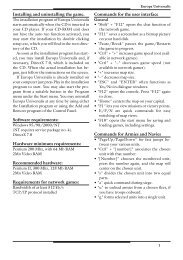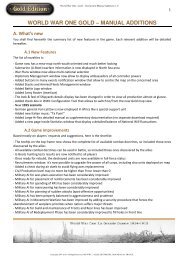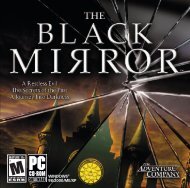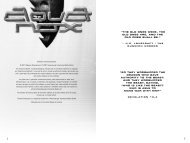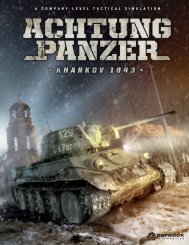You also want an ePaper? Increase the reach of your titles
YUMPU automatically turns print PDFs into web optimized ePapers that Google loves.
strong leader, inspiring confidence in the fighting men by his many visits to<br />
the trenches, a confidence which spread to the home front and it was said<br />
“We believed in Clemenceau rather in the way that our ancestors believed<br />
in Joan of Arc.” He supported the policy of total war and of war until the<br />
end, never believing that France would achieve anything other than total<br />
victory. After 1918, he was nicknamed “Père La Victoire” (Father Victory).<br />
Clemenceau would die on November 24th, 1929 at the age of 88.<br />
Conditions: not before 1917.<br />
Difficulty: die roll 2+.<br />
Enter in play: Events phase, any turn.<br />
Option #1: (historical choice) Clemenceau appointed Président du Conseil –<br />
As long Clemenceau keeps his office, France will benefit from the<br />
following bonuses: -1 die-roll modifier to all Social Unrest tests (strikes,<br />
mutinies, rebellions, revolution, capitulation), -1 modifier to all Parliament<br />
tests, +1 modifier to all War Weariness tests. In addition, the Parliament<br />
Mood of France will immediately move two boxes towards the Sacred Union.<br />
Notes: once successfully in play, the event is discarded and cannot occur<br />
again.<br />
Polivanov<br />
Description: This event will bring a lot of positive benefits for Russia! Civil<br />
Production of Russia will be immediately lowered by 1 point. As long as<br />
Polivanov will keep his ministry, Russia will benefit of the following rules: +1<br />
to the die-roll of Wartime Economy political actions tests, one free munition<br />
site available, a revenue of 20 Economic Points per Interphase, Russian<br />
railways do not deteriorate and maintain their current level. Beware that<br />
each Interphase Polivanov can be sacked (a test is performed) and<br />
Rasputin helps a lot in such a job!<br />
Historical notes: Polivanov was appointed to the State Council in 1912 and<br />
served until June 1915 when he replaced Vladimir Sukhomlinov as Minister<br />
of War. He at once started transforming the Russian army’s training<br />
methods and attempted to tackle the chronic communications and supply<br />
systems with some success. However in March 1916 he was sacked after<br />
alienating the Tsarina for trying to persuade Tsar Nicholas not to replace<br />
Grand Duke Nikolai as commander-in-chief of the army. Following the<br />
Russian Revolution, Polivanov joined the Red Army in February 1920,<br />
participating in the Soviet-Polish peace talks in Riga later that year but died<br />
during the talks of typhus.<br />
Conditions: automatic.<br />
Difficulty: die roll 3+.<br />
Modifiers: +3 if Warsaw is under German or Austrian control.<br />
Enter in play: Events phase, any turn.<br />
Option #1: (historical choice) Polivanov appointed Minister – Civil<br />
Production of Russia is immediately lowered by 1 point. As long as<br />
188 World War One: La Grande Guerre 1914-1918<br />
Polivanov keeps his ministry, Russia will benefit from the following rules: +1<br />
to the die-roll of Wartime Economy political actions tests, one free munition<br />
site available, a revenue of 20 Economic Points per Interphase, Russian<br />
railways do not deteriorate and maintain their current level. Be aware that<br />
a test is performed each Interphase that could result in Polivanov’s<br />
dismissal and Rasputin may not make the best of successors!<br />
Notes: once successfully in play, the event is discarded and cannot occur<br />
again.<br />
Successful Jihad<br />
Description: This event will see the Ottoman Empire successfully call for<br />
Jihad! The Turkish Parliament mood will move one step towards the Sacred<br />
Union. All Turkish “Arab” units will gain a veteran morale status. The<br />
destroyed or wounded Arab units will be immediately rebuilt at full strength<br />
in Damascus. As long the Jihad is be in effect (until the Arab Revolt<br />
breaking out), Turkey will benefit of a -2 bonus to the Desertion tests die<br />
rolls.<br />
Historical notes: In 1914, the Ottoman Empire declared a jihad against the<br />
Entente to mobilize Muslims against the West. The fatwa that was<br />
published called Muslims in Russia, France, and Great Britain to<br />
participate in the holy war against the heathens. The whole call was a<br />
failure, but it could have been different.<br />
Conditions: Turkey must be at war against the Entente.<br />
Difficulty: die roll 3+.<br />
Enter in play: Events phase, any turn.<br />
Option #1: (historical choice) Jihad – The Turkish Parliament mood moves<br />
one step towards the Sacred Union. All Turkish “Arab” units gain a veteran<br />
morale status. The destroyed or wounded Arab units are immediately<br />
rebuilt at full strength in Damascus. As long the Jihad is in effect (until the<br />
Arab Revolt breaking out), Turkey will benefit of a -2 bonus to the Desertion<br />
tests die rolls.<br />
Notes: once successfully in play, the event is discarded and cannot occur<br />
again.<br />
Propaganda<br />
Description: This event will allow you to make one of the nations under your<br />
control to benefit from one of the following bonuses: on social tests, on<br />
stability tests, on parliament attitude.<br />
Historical notes: Each of the nations which participated in World War I used<br />
propaganda not only as a means of justifying involvement to their own<br />
populace, but also as a means of procuring men, money and resources to<br />
sustain the military campaign. Heavy restrictions were introduced on press<br />
reporting and photography, and posters employed for army recruitment,<br />
and to urge thrift or to obtain funds from the general public from<br />
subscription to war bond schemes. In his book Falsehood in Wartime,<br />
Arthur Ponsonby explained the role of wartime propaganda; People must



